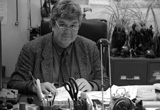 Last month BBC Radio 4’s Today programme transmitted more ominous alarms about dementia. The rate of our dying from dementia is rapidly increasing, we are informed. But this is a misconstruction (commonly repeated in the popular press and even in more official channels) and can easily mislead.
Last month BBC Radio 4’s Today programme transmitted more ominous alarms about dementia. The rate of our dying from dementia is rapidly increasing, we are informed. But this is a misconstruction (commonly repeated in the popular press and even in more official channels) and can easily mislead.
Most (though certainly not all) dementia is age related and thus likely to be part of a broader degeneration and involution. As we live longer our declines and deaths are thus more likely to be multifactorial: dementia may be a herald. More often, then, we can confidently assert that someone dies with dementia (a description) rather than from dementia (a cause).
This distinction may be important for our attitude and approach. The former tends to a more holistic, pastoral type of care that places the emphasis on our personal and social resources and containment. The latter will attempt to reverse and control by technical and procedural interventions. These contrasting two approaches may be thought to signify the best of old fashioned and contemporary medical practice.
Dementia thus refers to a wide range of deteriorations, few of which are currently treatable. Even if research yields effective therapeutics we are still likely to be left with much difficulty and sorrow. Every living creature eventually ails and dies. In the meantime we conscious humans struggle to find meaning, control, and certainty to counter these.
Much will elude us, but we can, at least, ease our plight by clarifying our language.
David Zigmond is a GP in London.
Competing interests: I declare that I have read and understood BMJ policy on declaration of interests and I have no relevant interests to declare.
